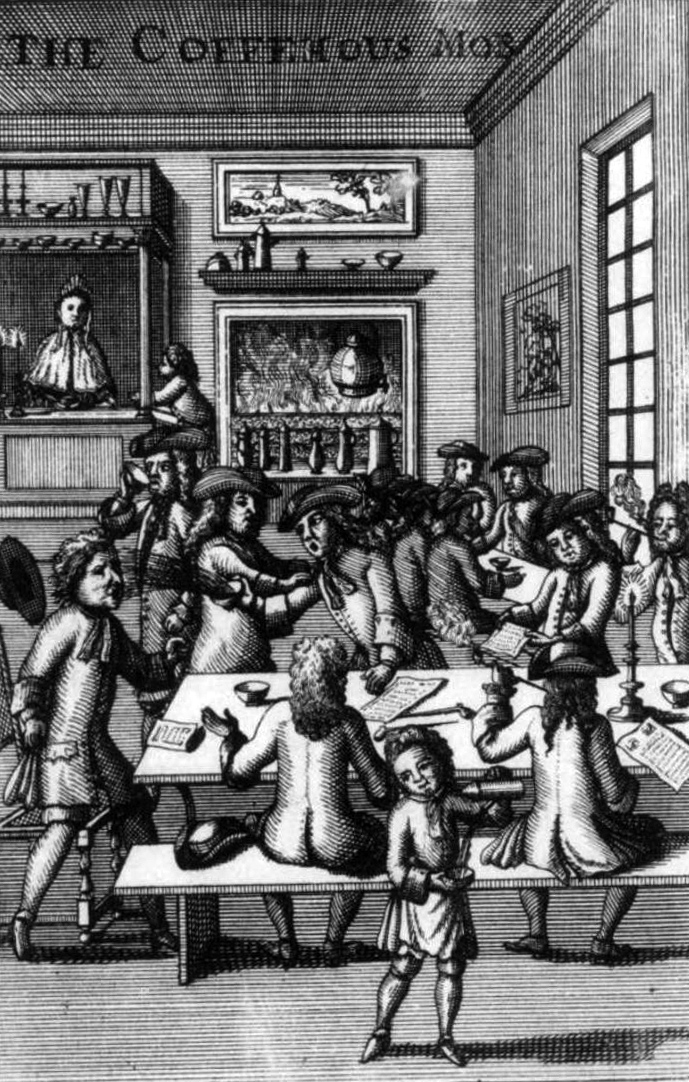 Above a rowdy debate in a London coffee house in the latter quarter of the 18th century.
Above a rowdy debate in a London coffee house in the latter quarter of the 18th century.
Amanda Plattell in her column in today’s Daily Mail deprecates the descent into boisterousness of last Thursday night’s Question Time.
Herewith the link to her article: http://www.dailymail.co.uk/debate/article-2872298/PLATELL-S-PEOPLE-Question-Time-sink-low.html
The British Gazette would disagree. Indeed the Editor has some time for Amanda Plattell but finds himself in the unusual position of saying for once the BBC actually did something right!!!!
Far from being mistaken, the BBC actually achieved a small measure of success. As most British Gazette readers will know the programme is broadcast after the 10:00PM News on BBC1. It is recorded earlier that evening. The main reason it is not broadcast live is that it is not regarded as “Prime Time” material. This is because most viewers unlike Amanda Plattell are not terribly interested in politics and the idea of sitting down for an hour to listen to erudite political debate is not for them. To make these folk tune in the debate would have to be “livened up” – considerably.
The Editor once made this point to an audience back in the 1990s when he was addressing a conference held in a hotel in Calderdale in the West Riding of Yokshire on a sunny Saturday afternoon. “Look out of the window.” the audience were told. The view was a lovely one of Calderdale. “Now ask yourselves this. What do you think most of the public would like to do now if they had a spare hour or two? Attend this political meeting or go out for a walk in the beautiful countryside? We have to accept that we are a minority, that detailed political debate bores most and we need to get the message across in short bullet points.”
Historically rowdy debate has been the norm in this country. The red lines on the floor or the House of Commons and the ban on swords being taken into the chamber (that is why the pink ribbons are on the coat-hangers) were to stop MPs from fighting. Debate outside the Commons by interested members of the public was just as rowdy. It was also popular.
The Morning Chronicle of 27th March 1780 reported “The Rage for publick debate now shews itself in all quarters of the metropolis. Exclusive of the oratorical assemblies at Carlisle House, Free-mason’s Hall, the Forum, Spring Gardens, the Cassino, the Mitre Tavern and other polite places of debating rendezvous, we hear that new Schools of Eloquence are preparing to be opened in St. Giles, Clare-Market, Hockley in the Hole, Whitechapel, Rag-Fair, Duke’s Place, Billingsgate, and the Back of the Borough.”
The problem with polite political debate with a panel comprised of establishment politicians (e.g.: Frank Field, Ken Clarke, Vince Cable and Amanda Plattell) is that it will always be a minority interest.
The fact of the matter is this: there are serious issues to debate. The UK is mostly governed from Brussels. The UK has a huge sovereign debt. The UK has a looming power generation crisis. The UK government is now accountable to the Credit Reference agencies more than the electorate. These are not topics for anodyne discourse.
Speaking the Truth unto the Nation

I agree with you, it was one of those rare occasions that it felt as though it was actually worth watching.
I enjoyed seeing Brand skewered by the chap in the audience who challenged him to stand for Parliament. Didn’t he sound feeble when he said he didn’t want to become like ‘one of them’?
I thought Farage acquitted himself well, at least he didn’t lose the plot in the way Brand did and Dimbleby appeared to throw in the towel!